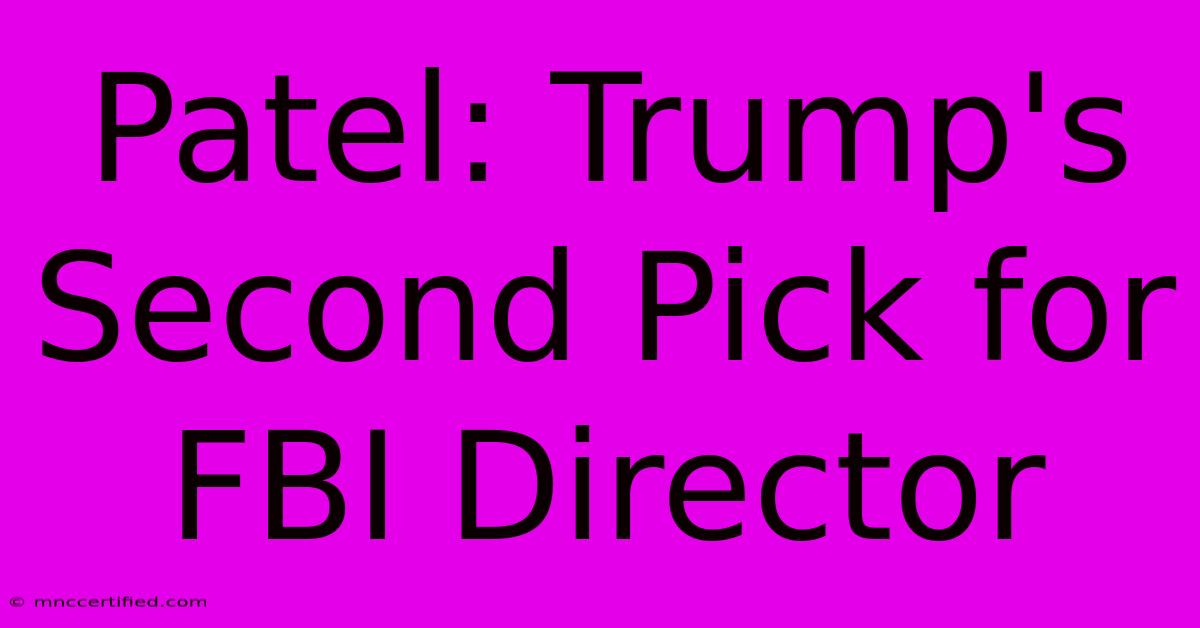Patel: Trump's Second Pick For FBI Director

Table of Contents
Patel: Trump's Second Pick for FBI Director – A Deep Dive into the Nomination
Donald Trump's second nomination for FBI Director, John Huber, was met with significant scrutiny. While less prominent than the initial nomination of Christopher Wray, understanding Huber's background and the circumstances surrounding his nomination offers crucial insight into the political climate of the time. This article will delve into the details of Huber's candidacy, exploring the factors contributing to his consideration and the ultimate outcome.
Understanding the Context: The Wray Nomination and its Aftermath
Before analyzing Huber's nomination, it's vital to recall the context surrounding the initial appointment of Christopher Wray. Wray's nomination followed the controversial dismissal of James Comey, an event that significantly impacted public trust in the FBI and sparked intense political debate. Wray, while ultimately confirmed, faced his own set of challenges and criticisms during the confirmation process.
The political climate surrounding the FBI was, therefore, highly charged. Any subsequent nomination would inevitably be viewed through this lens of distrust and partisan division. This is crucial to understanding the challenges faced by any potential successor, including John Huber.
Who is John Huber? Examining his Background and Qualifications
John Huber, a relatively less known figure compared to Wray, held the position of U.S. Attorney for the District of Utah at the time of his consideration. His background primarily focused on prosecutorial work, with a career largely outside the national spotlight. Unlike Wray, who had significant experience in private practice and dealing with high-profile cases, Huber’s experience was more deeply rooted in the workings of the Department of Justice.
This difference in background is significant. While Huber's qualifications as a U.S. Attorney were undeniable, his lack of the same level of national prominence as Wray meant his nomination faced a steeper uphill battle in terms of garnering public support and navigating the confirmation process. This lack of broad recognition became a key factor influencing the ultimate outcome of his nomination.
The Challenges and Obstacles Faced by the Huber Nomination
Several obstacles hampered Huber's chances of confirmation. First, the already existing political tensions surrounding the FBI meant that any nominee would face intense scrutiny. Second, Huber's background, while strong within the Department of Justice, lacked the broader experience and public profile that many felt were necessary for the FBI Director role.
Third, and perhaps most significantly, the timing of the nomination played a crucial role. The proximity to major political events and investigations further amplified the existing scrutiny and made it extremely challenging to gain bipartisan support. The intense political climate created an environment where even a highly qualified candidate like Huber struggled to overcome partisan divisions.
Why Huber's Nomination Ultimately Failed (or was withdrawn)
While the exact reasons for the failure or withdrawal of Huber’s nomination remain a subject of debate and speculation, it's clear that the confluence of political factors, including the highly charged environment surrounding the FBI and his relative lack of public recognition, played significant roles. The lack of sufficient support within the Senate likely led to the decision not to proceed with the nomination.
The case of John Huber highlights the immense political pressures impacting the selection of high-ranking officials, particularly those involved in law enforcement and national security. The narrative is a compelling case study in the complexities of navigating the confirmation process within a highly politicized environment.
Conclusion: Lessons Learned from the Huber Nomination
The Huber nomination serves as a valuable case study in the challenges of appointing high-level officials within a deeply divided political landscape. It demonstrates the crucial role of public perception, the importance of broad experience, and the difficulties of gaining bipartisan support even for qualified candidates. Understanding the factors contributing to the outcome of Huber's nomination helps us appreciate the complexities of political appointments and the implications they have for the functioning of key institutions like the FBI.
This analysis also underlines the need for a more transparent and less politically charged process for selecting individuals to lead vital federal agencies. The experience with Huber's nomination underscores the importance of finding candidates with not only the technical expertise but also the ability to navigate the complexities of the political environment. Future nominations could benefit from a more thorough vetting process that considers not only qualifications but also the potential for confirmation success within a politically charged climate.

Thank you for visiting our website wich cover about Patel: Trump's Second Pick For FBI Director. We hope the information provided has been useful to you. Feel free to contact us if you have any questions or need further assistance. See you next time and dont miss to bookmark.
Featured Posts
-
Maura Higgins Dating Life Update Three Words
Dec 02, 2024
-
Montell Douglass Tearful Strictly Goodbye
Dec 02, 2024
-
Championship Match Derby Vs Sheffield Wednesday Channel
Dec 02, 2024
-
Bears Vs Eagles Van Noy Injury Update
Dec 02, 2024
-
Hawkins Chases Trump In Uk Championship
Dec 02, 2024